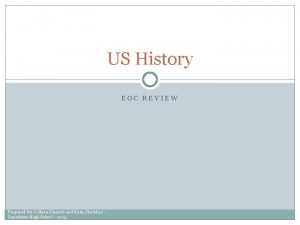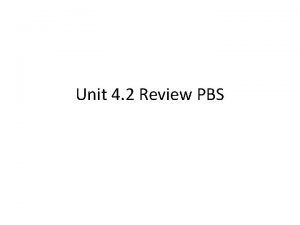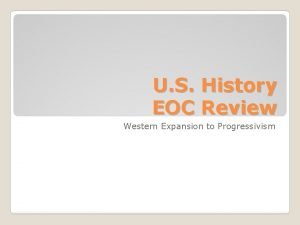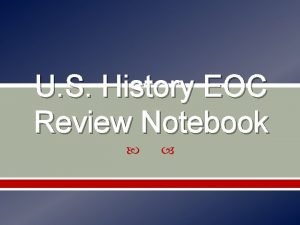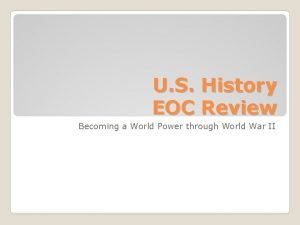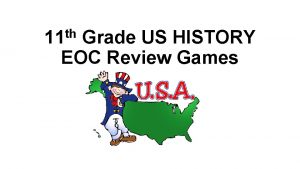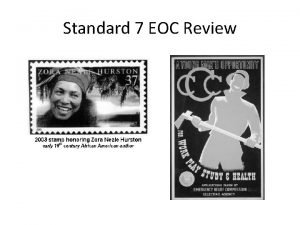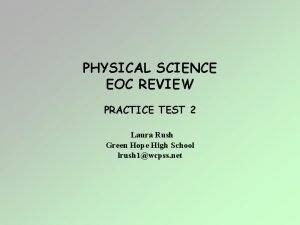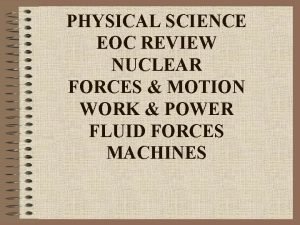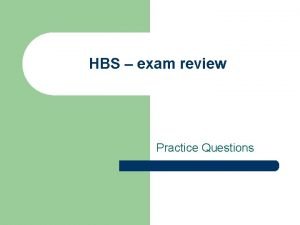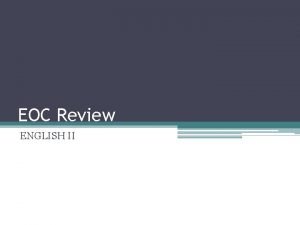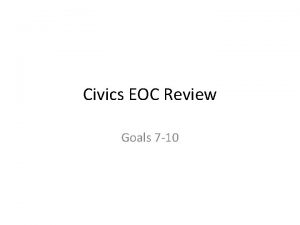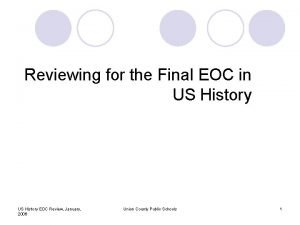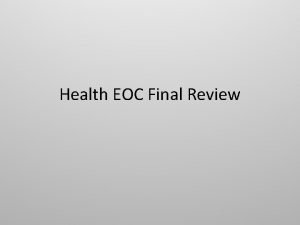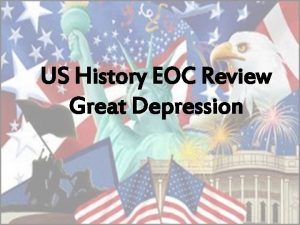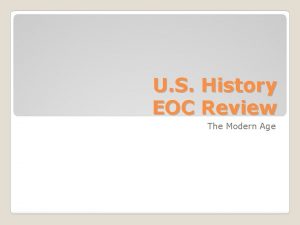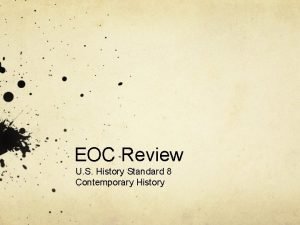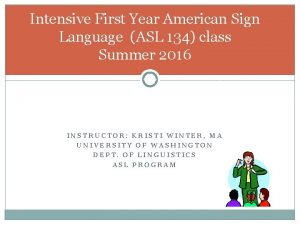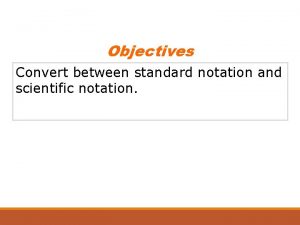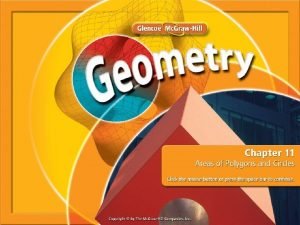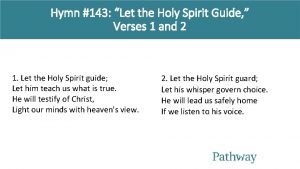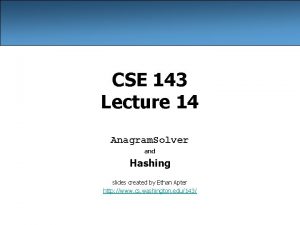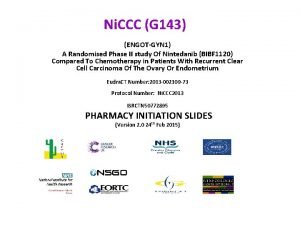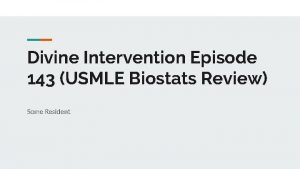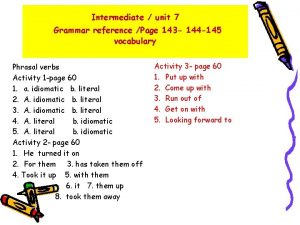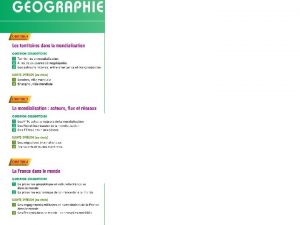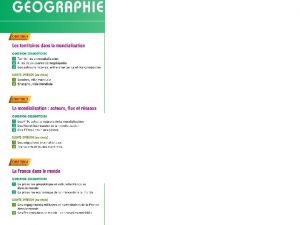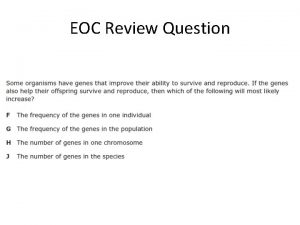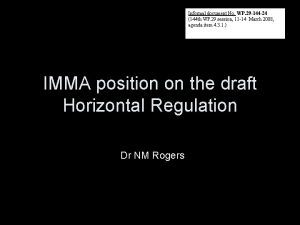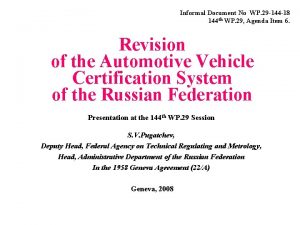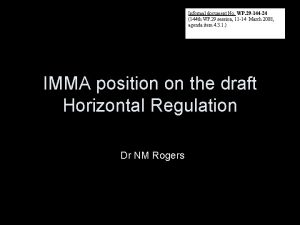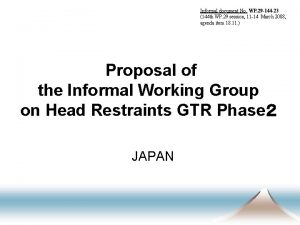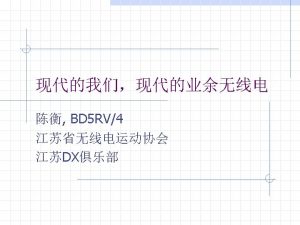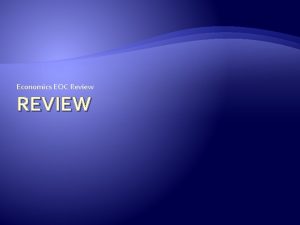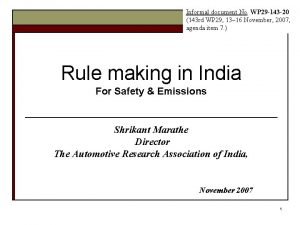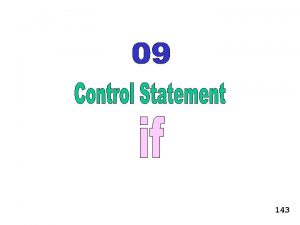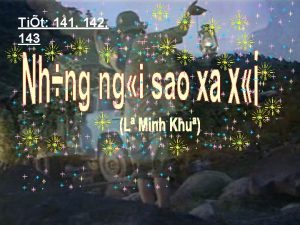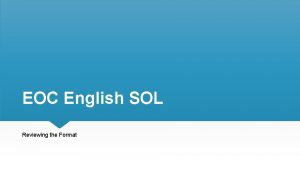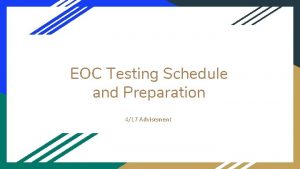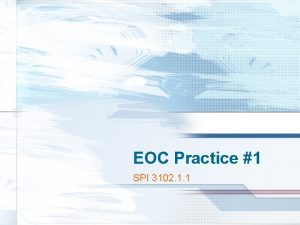EOC REVIEW Page 143 Unit 1 Page 144































- Slides: 31

EOC REVIEW Page 143

Unit 1 Page 144

Purpose of Government • To provide order – police, military, laws • Provides services – health care, roads, parks… • Provides security – police, military • Guides the economy – budget, taxes

Levels of Government Federalism – means to have the power divided into different levels. • National/Federal • State • Local (Separation of Powers refers to the 3 branches of government)

American Democracy • Democracy is a government where the people are in control – by voting. • Principles of democracy – Rule of law – everyone is bound by the law – Limited government – government with restrictions on its powers – Individual rights – every person has basic rights – Consent of governed – people create the government – Representative government – people vote for representative who in turn make decisions for them.

Political States • Federal – Power is divided into levels – (federal = federalism) • Confederate – Independent countries come together for a specific need/purpose. • Unitary – ALL the power of one country is held by ONE government

Forms of Government • Democracy – Direct – all people vote – Representative – elected officials vote for the people • Authoritarian – one leader or group of leaders have absolute power • Totalitarian – government controls all aspects of peoples lives • Dictatorship - one leader or group of leaders have power with the use of the military and police. • Monarchy – leader decided by family blood line – Absolute – King or Queen – Constitutional – King or Queen rule with a lawmakers that are elected. • Parliament – law makers • Prime minister – legal leader

Citizenship • • Immigration – moving into a new country Emigration – exiting a country Alien – person who enters a new country illegally Deportation - person who is sent back to the country where they are citizens • Naturalization – officially becoming a citizen of a new country Responsibilities • VOTE!!! – 18 years old, US Citizen, Registered, not declared mentally incapacitated

Unit 2

Philosophers • John Locke – natural rights – life, liberty and property – Declaration of Independence • Baron Montesquieu – separation of powers – Constitution - 3 branches of government

Magna Carta • British Document • 1215 – first document that put a limit on the king’s powers – Trial by jury – Right to rebel if government broke the contract.

English Foundations • Parliament – lawmakers that assist the king/queen with ruling the country – Congress • Common Law – basic laws that all people must follow – Rule of law • English Bill of Rights – founding rights that the USA used when writing their Bill of Rights – Due process of the law – No cruel punishment – People have the right to petition the king/government

Colonial Governments • Jamestown – Representative Democracy – Virginia House of Burgesses – was the congress/law makers • Plymouth – Direct Democracy – Mayflower Compact – contract where the Pilgrims agreed on creating a government and on following the laws

Events Leading to Independence 1. 2. 3. 4. 5. 6. Sugar Act – 3 cent tax on sugar Stamp Act – a tax on all official papers Declaratory Act – gave Britain the right to tax the colonies as they saw “fit” Townshend Act – tax on glass and other items Tea Act – tax on tea – lead to the Boston Tea Party – Where colonists protested the tax Coercive/Intolerable Act – quartering of British troops in colonists homes ** No Taxation Without Representation” – colonists did not think the British should tax them if they did not have colonists in the British Parliament as representatives.

Continental Congress • 1 st Continental Congress – Was a response to the Coercive acts – Sent a letter to the King and organized a total boycott of British products • 2 nd Continental Congress – Met after the 1 st battles of the Revolutionary war were fought (Lexington and Concord) – Decided to officially declare independence

Declaration of Independence • 48 delegates met in Philadelphia • Life liberty and the pursuit of happiness – John Locke’s idea • Thomas Jefferson was the main writer of the Declaration of Independence. • Declaration stated all the reasons why the colonists were upset with the king. • Signing the declaration was considered treason

Unit 3

Articles of Confederation • 1777 – The first governing document of the USA. • Created 13 independent states that would have: – Common laws – Common Military • Did not work! – No taxes, and so military could not be paid – No official leader to enforce laws – No standard money

Plans for the New Government • Virginia Plan – – Big State Representation based on the population Wanted legislature to elect executive (parliament) Legislative branch to have military power • New Jersey Plan – – Small State Equal Representation (2 per state) Wanted legislature to elect executive (parliament) Executive Branch to have military power

Compromises • 3/5 th Compromise – Each slave would count as 3/5 th of a person when totaling the population of a state • Great Compromise – Legislature would have 2 houses • Senate – equal representation • House of Representatives – representation based on population • Slave Trade and Commerce Compromise – Northern states would trade without paying taxes – Southern states would continue to have slaves

Basic American Principles • Popular Sovereignty – People are in control of the government • Limited Government – The government has limits on its powers • Rule of Law – There are laws and everyone must follow them • Separation of Powers – There are 3 branches of government, and each have different powers • Checks and Balances – Each branch overlooks what the other 2 branches are responsible for doing • Federalism – There are levels of government – National – State Local

The US Constitution • • • Preamble – Introduction, We the people… Article 1 - Creates Legislative Branch Article 2 – Creates Executive Branch Article 3 – Creates Judicial Branch Article 4 – Talks about the relationship between national and state governments • Article 5 – Amending the Constitution • Article 6 – The Supremacy Clause – The Constitution is the Supreme Law of the Land • Article 7 – Describes how to ratify (pass) the Constitution

Federalists and Anti Federalists • Federalists – Wanted the Constitution to pass – Did not want a list of rights – thought the list would get too long (that is why the 9 th amendment says you have rights that are not listed. ) • Anti Federalists – Thought the Constitution gave too much power to the national government – Wanted the Constitution to contain a Bill of Rights

Bill of Rights 1. GRASP – Get Religion Assembly Speech and Press 2. Right to own guns 3. Do not have to quarter troops 4. Search warrants are needed 5. Right to remain silent, no double jeopardy, eminent domain, due process, be indicted (officially accused) 6. Speedy trial 7. Civil Trials 8. No Cruel Punishment 9. You have rights that are not listed 10. And right not given to the national government in the Constitution belongs to the states

Other Amendments 13 – Ended Slavery 14 – Defined citizenship and said that ALL people would be treated equally before the law. 15 – Prohibited the denial of suffrage (right to vote) based on race, color, or previous condition of servitude 19 – Women’s Suffrage (right to vote for women) 24 – Prohibited the use of poll taxes to keep people from voting. 26 – Dropped voting age from 21 to 18 18 and 21 – 18 made drinking alcohol illegal – 21 made dinking alcohol legal again.

Unit 1 -3 Study Questions 1. What are the 4 purposes of government? 2. What are the 3 different political states? Draw a picture to represent each one. 3. What is the difference between the two different types of democracies? 4. What is a republic? 5. As a naturalized citizen what is your most important responsibility? Why is that the most important?

6. What did John Locke believe in? How did this influence the government of the USA? 7. What is a similarity between parliamentary government and American government? 8. What was the Mayflower compact? What principle of American democracy did it establish? 9. List 3 events that led the colonists to rebel against the king? 10. What was decided at the Second Continental Congress meeting? 11. Why was writing and signing the declaration of Independence dangerous?

12. What type of government did the Articles of Confederation create? Why was it a flawed government? 13. Why was the Connecticut Compromise also known as the Great Compromise? 14. Why do we have a federal government? 15. Why were the anti federalists not in favor of ratifying the Constitution? 16. List the first 10 amendments in order **Bonus** List the 3 amendments that are about voting rights, and state what each one did.

5 Minute Study Unit 1 -3 Quiz

Unit 1 – 3 Quiz

1. What purpose of government is being fulfilled by there being a public park? 2. What type of government exists if the country is small and has just one ELECTED leader that takes care of all problems? 3. Why is consent of the governed important in our democracy? 4. How is America’s government similar to England’s government? 5. What do you call the process of officially becoming a USA citizen? 6. Why is the Magna Carta important in the USA? 7. What document was signed by the Pilgrims to agree on a government and create laws? 8. What philosopher’s ideals were used in writing the declaration of Independence? 9. Why did the Federalists oppose adding a bill of Rights to the Constitution? 10. What Amendment ended slavery?
 Melodia salmo 143 bendito seja o senhor meu rochedo
Melodia salmo 143 bendito seja o senhor meu rochedo Florida us history eoc review
Florida us history eoc review Pbs eoc review
Pbs eoc review Gilded age eoc blitz review
Gilded age eoc blitz review Us history eoc review notebook
Us history eoc review notebook This area along the german/belgian border was demilitarized
This area along the german/belgian border was demilitarized Us history eoc review activities
Us history eoc review activities Standard 7 eoc review
Standard 7 eoc review Physical science eoc review
Physical science eoc review Physical science eoc review
Physical science eoc review Hbs eca study guide
Hbs eca study guide Mr raymond civics eoc review
Mr raymond civics eoc review English eoc review
English eoc review Civics eoc review
Civics eoc review Biology eoc review georgia
Biology eoc review georgia Biology 10 day eoc review
Biology 10 day eoc review Day 1 us history eoc review
Day 1 us history eoc review Day 1 us history eoc review
Day 1 us history eoc review Us history eoc review the great depression and the new deal
Us history eoc review the great depression and the new deal Gilded age eoc blitz review
Gilded age eoc blitz review Day 8 us history eoc review
Day 8 us history eoc review Unit 6 review questions
Unit 6 review questions Signing naturally 3:15
Signing naturally 3:15 Algebra 2 unit 1 test
Algebra 2 unit 1 test 143 000 in scientific notation
143 000 in scientific notation 11-1 area of parallelograms
11-1 area of parallelograms Hymn 143
Hymn 143 Cse 143 letterinventory
Cse 143 letterinventory Air canada side slip
Air canada side slip Ccc 143
Ccc 143 Divine intervention resident
Divine intervention resident Sp 143 warszawa
Sp 143 warszawa

